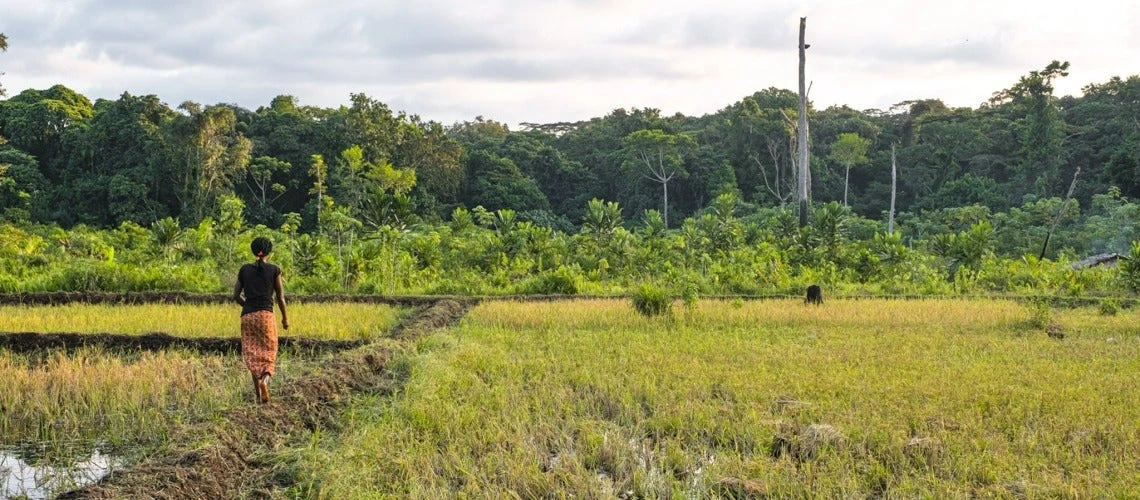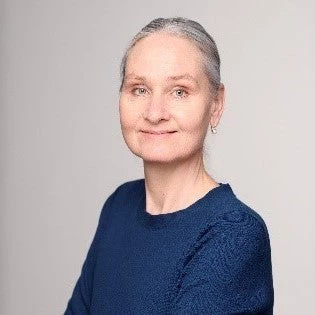 Woman walks through pisciculture and rice field in Yanonge, Democratic Republic of the Congo.
Woman walks through pisciculture and rice field in Yanonge, Democratic Republic of the Congo.
Ana Luz Diaz fights forest fires in Costa Rica’s Nicoya Peninsula, one of five women on a 30-member fire brigade. Vitória Duarte is a eucalyptus farmer who is helping her community embrace more profitable climate-smart agriculture in Mozambique’s Zambezia Providence. They and thousands of women around the world are playing a vital role in supporting and leading climate action in their communities. Their day-to-day efforts are the building blocks of green, resilient, and inclusive development and at the heart of the theme of this year’s International Women’s Day, “Gender equality today for a sustainable tomorrow”.
Examples like Ana and Vitória, however, are not yet nearly as widespread as they could be. The World Economic Forum estimates that reaching economic gender parity will take 135 years, putting the “sustainable tomorrow” out of reach for yet another generation of women and men. Prescribed gender roles still perpetuate inequalities, meaning most women continue to face challenges in accessing information and resources, getting a seat at the table where decisions are made, and receiving an equal share of economic opportunities. As long as women are overlooked, the full potential of green, resilient and inclusive development will never be reached. We must move faster, and we can.
"As long as women are overlooked, the full potential of green, resilient and inclusive development will never be reached. We must move faster, and we can."
That’s why at the World Bank, we are helping governments, development practitioners, donors, and beneficiaries themselves identify and seize opportunities to make climate action more gender inclusive. And we do this backed with evidence about the benefits of gender equality in our work, specifically in sustainable forest management and REDD+, which looks at how developing countries can be compensated for their efforts to preserve forests and reduce emissions. With Results-Based Climate Finance now disbursing payments for achieved and verified emissions reductions, these learnings could not be timelier.
For instance, in order to be more effective, our studies found that forest-related programs must explicitly include women in their design and implementation. They must take into consideration the differences between men and women and the structural and behavioral barriers that impede the participation of women. Failing to do so perpetuates exclusion and stunts programs even before they begin.
"In order to be more effective, our studies found that forest-related programs must explicitly include women in their design and implementation."
In Costa Rica, for example, we worked with the government and the Forest Carbon Partnership Facility (FCPF) to conduct a gender analysis that led to a roadmap and action plan for increasing women’s involvement in REDD+ activities. Looking at the land use sector through a gender lens brought into focus some stark realities such as the legal barriers women face around property ownership. This drove new thinking on how to motivate, support, and recognize women’s contributions to sustainable and productive landscape initiatives. Costa Rica’s Payment for Environmental Services Program now gives priority access to women and eases the property rights requirements that had hindered their participation in the past.
We also examined forest-related value chains in Lao PDR (bamboo), Republic of Congo (cocoa), and Costa Rica (cocoa and bananas) which revealed opportunities to support women producers while reducing emissions. Projects are being designed to help female famers gain access to climate-smart production techniques and resources geared toward them, like training, agricultural inputs, marketing support and financing. These gender-sensitive interventions will improve production efficiencies and environmental sustainability - and lead to higher incomes and better livelihoods.
To further support inclusion across results-based climate finance programs, we launched the Enhancing Access to Benefits while Lowering Emissions (EnABLE) fund in 2020. EnABLE has commenced operations in the FCPF Carbon Fund countries to identify and pursue opportunities to enhance gender equality. It does this through the implementation of the Benefit Sharing Plans, which are integral to emissions reductions programs, and ensure that all people are fairly recognized and rewarded for their role in reducing emissions, including through forest conservation and sustainable forest management.
Please join us for a webinar featuring our most recent studies and knowledge products on strengthening women’s participation in REDD+ and forest-related programs. Part of our Social Inclusion in Climate Finance knowledge series, the webinar will take place on Monday, March 7th at 9:30am Eastern Time. Click here to register.


Join the Conversation